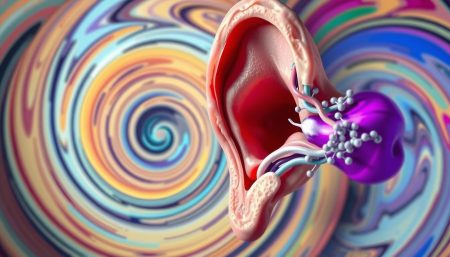Feeling like the world is spinning? You’re not alone. Vertigo can be disorienting and frustrating, but there are ways to find relief. This guide explores effective natural remedies for vertigo that can help you regain your balance and improve your daily life.
From simple exercises to lifestyle changes, we’ll dive into various vertigo relief techniques that you can try at home. Whether you’re dealing with occasional bouts or chronic symptoms, understanding what helps with vertigo can make a significant difference in managing this condition.
Get ready to discover practical strategies and natural approaches that may alleviate your vertigo symptoms and help you feel more stable on your feet. Let’s explore the world of vertigo relief together and find the solutions that work best for you.
Understanding Vertigo: Causes and Symptoms
Vertigo makes you feel like the world is spinning. Knowing the symptoms is key to managing it. Let’s dive into what vertigo is and how to deal with it.
Common Types of Vertigo
Vertigo comes from different sources, each with its own traits:
- Benign Paroxysmal Positional Vertigo (BPPV): Triggered by head movements
- Meniere’s Disease: Accompanied by hearing loss and tinnitus
- Vestibular Neuritis: Often follows a viral infection
Distinguishing Vertigo from Dizziness
Vertigo and dizziness are not the same. Vertigo makes you feel like you’re moving, but you’re not. Dizziness is just feeling off-balance. Knowing this helps you tackle vertigo better.
Identifying Trigger Factors
Knowing what sets off your vertigo can help you avoid it. Common culprits include:
| Trigger Category | Examples |
|---|---|
| Physical Movements | Sudden head turns, standing up quickly |
| Dietary Factors | Caffeine, alcohol, high-sodium foods |
| Environmental Factors | Bright lights, loud noises, changes in air pressure |
| Emotional Factors | Stress, anxiety, lack of sleep |
By spotting these triggers and symptoms, you can manage vertigo better. This improves your life quality.
What Helps With Vertigo: Immediate Relief Techniques
Vertigo can hit you out of nowhere, making you feel dizzy and off-balance. Knowing how to quickly get relief can help you feel better. Here are some effective ways to get immediate vertigo relief.
The head-tilt maneuver is a simple yet powerful technique. Sit on the edge of a bed and tilt your head 45 degrees to the side. Then, lie down on your back with your head still tilted. Hold this for 30 seconds, then sit up slowly. This can help fix the inner ear crystals causing vertigo.
Controlled breathing exercises can calm you down and lessen vertigo symptoms. Inhale deeply for four counts, hold for four, and exhale for four. Do this several times to feel more stable.
Focusing on a fixed point can make you feel more balanced. Pick an object in your room and stare at it for a few minutes. This helps your visual system and reduces the spinning feeling.
- Stay hydrated to maintain proper fluid balance in your inner ear
- Use over-the-counter antihistamines for temporary relief
- Apply a cold compress to your neck to reduce inflammation
| Relief Technique | How It Helps | Duration |
|---|---|---|
| Head-tilt maneuver | Realigns inner ear crystals | 30 seconds per repetition |
| Controlled breathing | Calms nervous system | 5-10 minutes |
| Fixed-point focus | Recalibrates visual system | 2-3 minutes |
Remember, these quick relief techniques work best with long-term vertigo management. If your symptoms don’t get better or get worse, see a healthcare professional. They can give you advice tailored to your needs.
Essential Home Remedies for Managing Vertigo
Vertigo can be tough to handle, but many home remedies can help. These natural solutions can ease symptoms and make life better for those with vertigo.
Ginger-Based Solutions
Ginger is a strong natural remedy for vertigo. It fights inflammation, which can help with dizziness and nausea. Try ginger tea, candied ginger, or supplements for relief. For fast help, chew on a small piece of fresh ginger root.

Hydration and Dietary Adjustments
Drinking enough water is key in managing vertigo. Keep your body hydrated to balance fluids in your inner ear. Cut down on salt to avoid fluid buildup, which can make symptoms worse. Eat foods rich in potassium like bananas and avocados to help your inner ear.
Apple Cider Vinegar Treatments
Apple cider vinegar is a well-known remedy for vertigo. Mix two tablespoons of it with honey in warm water. Drink this twice a day to balance body fluids and lessen vertigo. Some people also use a vinegar-soaked compress on the affected ear for relief.
“I’ve found that incorporating these home remedies into my daily routine has significantly reduced my vertigo episodes. The ginger tea and apple cider vinegar drink have been game-changers for me.”
Adding these home remedies to your daily life might lessen vertigo episodes. Always talk to a healthcare professional before trying new treatments.
Proven Exercises and Physical Therapy Methods
Physical therapy is key in managing vertigo. Certain exercises can reduce dizziness and improve balance. Let’s look at some effective treatments you can do at home.
Epley Maneuver Guide
The Epley maneuver is great for vertigo, especially for BPPV. It involves head movements to fix inner ear crystals.
- Sit on a bed, turn your head 45 degrees to the affected side
- Quickly lie back with your head hanging off the bed
- Wait 30 seconds, then turn your head 90 degrees to the opposite side
- Wait another 30 seconds, then roll onto your side
- Slowly sit up and remain still for a few minutes
Brandt-Daroff Exercises
Brandt-Daroff exercises are simple and effective. They can be done at home and help your brain better process balance signals.
- Start in a sitting position on your bed
- Quickly lie down on your left side with your nose pointed up at a 45-degree angle
- Hold for 30 seconds or until dizziness subsides
- Sit up and wait for 30 seconds
- Repeat on the right side
- Do this exercise 5 times, twice daily
Balance Training Techniques
Balance training is vital for managing vertigo long-term. These exercises improve stability and reduce fall risks.
- Stand on one foot for 30 seconds, then switch
- Walk heel-to-toe in a straight line
- Practice standing with your eyes closed
- Use a balance board or foam pad for advanced training
| Exercise | Frequency | Benefits |
|---|---|---|
| Epley Maneuver | 1-3 times daily | Repositions inner ear crystals |
| Brandt-Daroff | Twice daily | Improves balance processing |
| Balance Training | Daily | Enhances overall stability |
Always talk to a healthcare professional before starting new exercises. Consistency is crucial for vertigo relief. Regular practice can lead to significant symptom improvement.
Natural Supplements and Herbal Treatments
Looking into natural remedies for vertigo can help many people. Supplements like Ginkgo biloba, Vitamin D, and magnesium are among the best. They might lessen symptoms and boost balance.
Ginkgo biloba is a well-known herb that may improve blood flow to the brain. This could help ease vertigo. Take 120 to 240 mg daily, but talk to a doctor first.
Vitamin D is important for vertigo, especially with BPPV. Taking Vitamin D might cut down on vertigo attacks. Your doctor will tell you how much to take based on your levels.
Magnesium is key for nerve and muscle health. Some research shows it can help with vertigo. Aim for 400-500 mg a day, but your needs might differ.
| Supplement | Potential Benefits | Typical Daily Dosage |
|---|---|---|
| Ginkgo biloba | Improved blood flow to the brain | 120-240 mg |
| Vitamin D | Reduced frequency of BPPV episodes | Varies (based on blood levels) |
| Magnesium | Enhanced nerve function and muscle control | 400-500 mg |
Herbal teas like ginger or peppermint can also help with vertigo. They might lessen dizziness and nausea. But, always remember to follow your doctor’s advice and not replace their treatments with these.
Lifestyle Modifications to Prevent Vertigo Episodes
Making changes to your daily routine can help manage vertigo symptoms. Adjusting your habits can reduce how often and how bad vertigo episodes are.
Sleep Position Adjustments
Your sleep position is important for easing vertigo. Using an extra pillow to elevate your head can help. Sleeping on your back or the side not affected by vertigo may also help.

Stress Management Techniques
Stress can make vertigo worse. Adding relaxation to your day can help. Try deep breathing, yoga, or meditation to calm your mind and body.
Environmental Modifications
Creating a safe living space is key. Remove things that could cause you to trip, install handrails, and make sure your home is well-lit. These changes help you stay safe during vertigo episodes.
| Area | Modification | Benefit |
|---|---|---|
| Bedroom | Adjust bed height | Easier to get in and out |
| Bathroom | Install grab bars | Improved stability |
| Living Room | Remove clutter | Reduced fall risk |
By making these lifestyle changes, you can actively manage vertigo symptoms. Remember, sticking to these tips is important for alleviating vertigo.
Medical Interventions and When to Seek Help
When vertigo symptoms are hard to manage, medical help is key. Vestibular rehabilitation therapy is a top choice. It helps your brain learn to balance again.
Doctors might give you medicine to help with vertigo. This could be antihistamines, anti-nausea drugs, or diuretics. Sometimes, surgery is needed for conditions like acoustic neuromas.
- Persistent vertigo lasting more than a few days
- Vertigo accompanied by hearing loss or ringing in the ears
- Severe headaches or vision problems
- Difficulty walking or speaking
At your doctor’s visit, you’ll get a detailed check-up. They’ll test your balance and eye movements. They might also do imaging studies to find the cause.
Early treatment is crucial. If vertigo is affecting your life, see a doctor. With the right care, many people see big improvements.
Alternative Therapies and Holistic Approaches
Looking into natural remedies for vertigo can lead to new treatments. These holistic methods can help along with traditional treatments. They might offer extra benefits for those looking for vertigo relief.
Acupuncture Benefits
Acupuncture, an ancient Chinese practice, is showing promise in managing vertigo symptoms. It involves putting thin needles into specific body points to restore balance and energy flow. Some patients say they feel less dizzy and overall better after acupuncture sessions.
Aromatherapy Options
Essential oils can help manage vertigo. Peppermint, ginger, and lavender oils are favorites. Inhaling these scents or applying diluted oils to the skin may help ease nausea and dizziness from vertigo episodes.
Mindfulness and Meditation
Mindfulness and meditation can be strong vertigo relief techniques. They help reduce stress, a common vertigo trigger. Regular meditation may improve balance, focus, and mental well-being. This could lessen vertigo’s impact on daily life.
- Deep breathing exercises
- Guided imagery sessions
- Body scan meditations
While these alternative approaches show promise, it’s key to talk to a healthcare provider before adding them to your vertigo management plan. Mixing these natural remedies with conventional treatments might offer a full approach to symptom relief.
Prevention Strategies and Long-term Management
To prevent vertigo and manage symptoms, you need to be proactive. Healthy habits and lifestyle changes can help a lot. They can make vertigo attacks less frequent and less severe.
Eating a balanced diet is key for vertigo management. Include foods high in vitamins B12 and D, and magnesium. These nutrients help your vestibular system and may ease vertigo.
Regular exercise is also important. Add balance training and vestibular rehabilitation to your routine. These exercises help your body stay balanced and can lower vertigo episodes.
It’s crucial to know and avoid triggers for vertigo. Common ones are:
- Sudden head movements
- Certain foods or beverages
- Stress and anxiety
- Lack of sleep
Keep a journal to track triggers. This helps you make lifestyle changes. It’s a powerful way to fight vertigo.
Daily habits that support vestibular health are essential. Practice good sleep, maintain posture, and drink plenty of water. These simple steps can greatly improve your life and lessen vertigo’s impact.
“Prevention is better than cure. By taking proactive steps to manage vertigo, you can regain control of your life and reduce the fear of unexpected episodes.”
Conclusion: Empowering Yourself Against Vertigo
Dealing with vertigo can be tough, but knowing what helps can empower you. This guide has shown you various ways to find relief. By trying different methods, you can find what works best for you.
Vertigo management often needs a combination of treatments. You might try home remedies like ginger tea and exercises like the Epley maneuver. Making lifestyle changes, like reducing stress and adjusting your sleep, can also help prevent episodes. Natural supplements and alternative therapies can offer extra support.
While self-help is important, don’t forget to work with healthcare professionals. They can give you personalized advice and track your progress. By using the techniques discussed here and getting expert help, you can create a plan to reduce vertigo’s impact. Stay proactive, be patient, and don’t hesitate to ask for help when you need it.
FAQ
Q: What are the most common causes of vertigo?
A: Vertigo can be caused by several things. Benign Paroxysmal Positional Vertigo (BPPV) and Meniere’s disease are common. Vestibular neuritis and labyrinthitis also play a role. Head or neck injuries, migraines, and some medicines can trigger vertigo too.
Q: How can I get immediate relief from vertigo symptoms?
A: For quick relief, try the head-tilt maneuver or controlled breathing. Over-the-counter antihistamines and staying hydrated help too. Always sit or lie down safely when you feel vertigo.
Q: What are some effective home remedies for vertigo?
A: Home remedies include ginger, staying hydrated, and avoiding certain foods. Apple cider vinegar can also help. These natural methods can ease vertigo symptoms for many.
Q: Which exercises are recommended for vertigo relief?
A: The Epley maneuver is great for BPPV. Brandt-Daroff exercises and balance training are also good. Doing these exercises regularly and correctly is important.
Q: Are there any natural supplements that can help with vertigo?
A: Yes, supplements like Ginkgo biloba, Vitamin D, and magnesium might help. Herbal teas can also be beneficial. Always talk to a doctor before trying new supplements.
Q: How can I modify my lifestyle to prevent vertigo episodes?
A: To prevent vertigo, change your sleep position and manage stress. Make your living space vertigo-friendly. Regular exercise and a balanced diet also help.
Q: When should I seek medical help for vertigo?
A: See a doctor if vertigo is severe, lasts a long time, or comes with other symptoms. If home remedies and lifestyle changes don’t work, get medical help.
Q: Can alternative therapies like acupuncture help with vertigo?
A: Some people find relief from vertigo with acupuncture, aromatherapy, and mindfulness. While evidence varies, these methods can help manage symptoms for some.
Q: How effective are the Epley maneuver and Brandt-Daroff exercises?
A: The Epley maneuver is very effective for BPPV, with high success rates. Brandt-Daroff exercises are also helpful when done regularly. These exercises help by moving calcium crystals in the inner ear.
Q: What dietary changes can help manage vertigo symptoms?
A: To manage vertigo, reduce salt, limit caffeine and alcohol, and stay hydrated. Avoiding trigger foods and eating more potassium can also help.


















